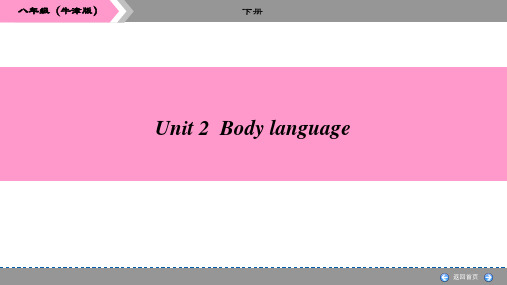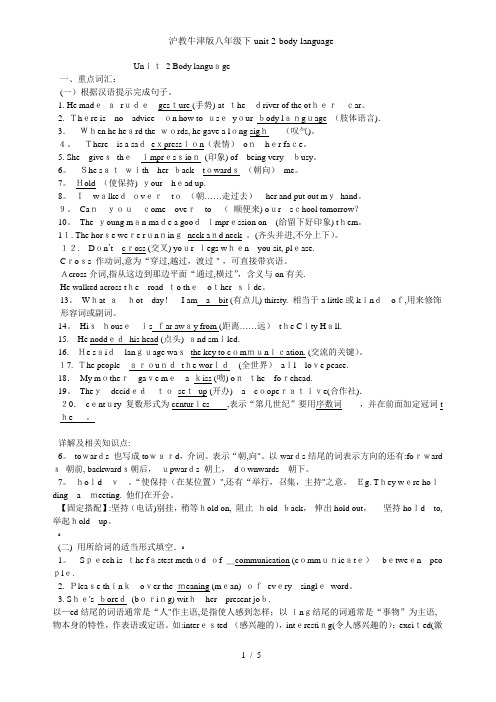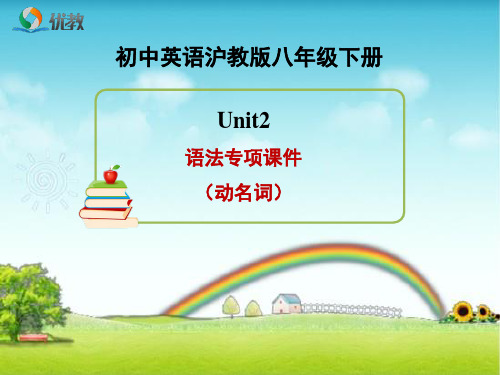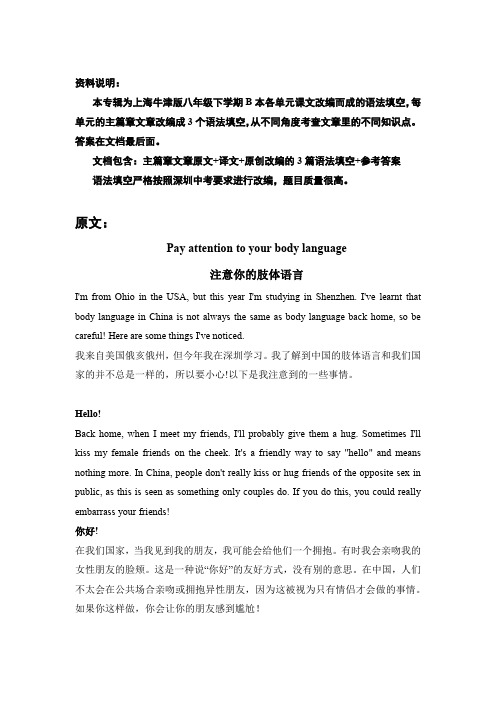沪教牛津版八年级下unit2bodylanguage(最新整理)
英语八年级下册牛津版Unit 2 Body language

返回首页
八年级(牛津版)
下册
16.一会儿后 aaffeewwmmoommeennttssllaatteerr 17.决定做某事 dedceicdiedetotododostsht.h. 18.感觉受欢迎 ffeeeellwweellccoommee 19.高兴地向某人打招呼 gigvievesbsb. a. achcheeerefruful gl rgereeteitningg 20.对某人笑 ssmmiilleeaattssbb. .
返回首页
八年级(牛津版)
下册
6.给某人一个好印象 mmБайду номын сангаасkaekea agogoododimimprpersessisoinonononsbs.b. 7.抬着头 hhooldldoonnee’s’shheeaadduupp 8.将头转向某人 tuturnrnoonne’es’shheaeaddtotowwaardrdsssbsb. . 9.提醒某人某事 rermeminidndsbs.ba. baobuotusttsht.h. 10.使某人想起某事 rermemininddsbsb. o. fofstshth. .
返回首页
八年级(牛津版)
18.以后;后来 adv.
下册
llaatteerr
19.提醒 v. rreemminindd
20.颈;脖子 n. nneecckk
21.使交叉 v. ccrroossss
22.点头 v. nnoodd
23.摇头;握手 v. sshhaakkee
24.确信;肯定 adj. ssuurree
返回首页
八年级(牛津版)
下册
3.你没有给人们留下好的印象。(give sb. a good impression/make
八年级英语(下)(沪教牛津版)Unit 2 Body language检测题附答案解析及听力原文

Unit 2 Body language检测题(时间:60分钟;满分:100分)一、听力部分(20分)I.情景反应根据你所听到的内容,选择正确的应答语。
每小题读两遍。
1. A. Yes, I think so. B. Thank you. C. Nice to meet you, too!2. A. Good idea. B. Yes, please. C. Never mind.3. A. Sorry, I can’t. B. Thank you for your help. C. Yes, I’d love to.4. A. The same to you. B. Have a good time. C. You’re so kind.5. A. You’re welcome. B. That’s right. C. I’m afraid not.II.对话理解根据你所听到的对话及问题选择正确答案。
每小题读两遍。
6. A. To ask for help. B. To say “hello”. C. To visit her friend.7. A. In a restaurant. B. At home. C. In the street.8. A. He is a child. B. He thinks the novel is boring.C. He likes the novel very much.9. A. Before he came to the UK.B. Before he came to China.C. After he came to China.10. A. He is easy-going. B. He is humorous. C. He is helpful.听下面一段长对话,回答11~12两个小题。
11. A. $1, 000, 000. B. $100, 000. C.¥1, 000, 000.12. A. Buy a car. B. Go travelling. C. Give the money to charity. 听下面一段长对话,回答13~15三个小题。
广州沪教牛津版八年级英语下册 Unit 2 Body language 单元检测卷(含答案)

广州沪教牛津版八年级英语下册Unit 2 Body language单元检测卷满分:100 分时间:90分钟一、单项选择(共10小题;每题1分,满分10分)1.— Would you like to see the film Iron Man 3 with me tonight, Kate?— I’d love to, but I’ve ________ Linda’s invitation to dinner.A. sufferedB. earnedC. receivedD. accepted2.— Where is my passport? I remember ________ it here.— You shouldn’t have left it here. Remember ________ it with you all the time.A. to put; to takeB. putting; takingC. putting; to takeD. to put; taking3.— I feel stressed from time to time. Could you give me some advice?— ________ sharing your worries with your parents?A. Why don’t youB. How aboutC. Why notD. Would you like4.After finishing his homework, he went on ________ a letter to his parents.A. writeB. writingC. wroteD. to write5.Why don’t you try ________ out the problem in another way?A. workingB. workC. to workD. worked6.The baby turned ________ his mother at once when be beard her call his name.A. towardB. towardsC. atD. on7.— Her words always make people ________ welcome.— Yes. She is good ________ with people.A. to feel; to communicateB. to feel; at communicatingC. feel; at communicatingD. feel; communication8.In order ________ for the meeting, my sister forced herself to get up early this morning.A. not to be lateB. not being lateC. to be lateD. being late9.I ________ Simon ________ when I passed by his room yesterday.A. see; was workingB. saw; was workingC. saw, workD. saw; working10.— ________?— I have a headache and I don’t feel like eating anything.A. How about going to the hospital?B. What can I do for you?C. What’s the matter with you?D. How do you like it?二、语法选择(共10小题;每小题1分,满分10分)Naismith’s idea gave birth to basketball. Naismith’s original idea was to make a game in which 11 only way to advance the ball was to pass it. Furthermore, in order to12 players would have to make the ball into a basket that was placed well above the players’ heads. Naismith reasoned these rules. They would reduce the violence and body contact to games at the time 13 soccer, rugby(英式橄榄球) and football. In the first basketball game which was played at the YMCA(基督教青年会), the players used a soccer ball. One team had nine players and played against 14 team on the court at a time. Peach baskets were used as “hoops”. Before the game, Naismith set up his immortal “13 rules” 15 the blackboard. In the original rules, each half was fifteen minutes long and there was a16 break between the halves. According to Naismith, the rules governing to breaking rules and traveling were most important as they prevented the boys 17 tackling, kicking, mobbing(围攻), and punching each in the first basketball game, the concept of 18 had not been established. Naismith’s game 19 became popular. The YMCA decided to spread the word about basketball beyond its walls. Now it becomes one of the most popular sports all over the world. Most of us enjoy 20 it very much. And we all know a lot of basketball players.11.A. a B. the C. an D. /12.A. score B. scoring C. scored D. scores13.A. such as B. as well as C. until D. as14.A. others B. another C. the other D. other15.A. at B. in C. on D. to16.A. five-minute’s B. five minute C. five minutes D. five-minute 17.A. from B. of C. off D. with18.A. travel B. travels C. traveling D. traveled 19.A. quick B. quicker C. more quickly D. quickly20.A. playing B. play C. plays D. to play三、完形填空(共10小题;每小题1分,满分10分)To raise money for cancer support, Henry Kehr ran 20 kilometres inside an empty plane at 36,000 feet. The young man travelled on an eight-hour flight from Atlanta to London in order to21 a half marathon for charity.His passion for health, happiness, and fitness has always been a huge part of his life, and now it has become more 22 than ever, he wrote on Instagram.“This year has been hugely 23 for everyone, especially those in the aviation industry (航空工业) .The COVID-19 has had a 24 effect on the support of many charities. So I thought I would try and raise some 25 for a few charities close to me.” Henry added.Henry said that his 26 passed away because of cancer two years ago. He also said that she has always been his inspiration(鼓舞), and 27 the challenge would be a way to fly high with her.He mentioned that this was a different 28 for him, “I have run many different races in the past including marathons but nothing quite as 29 as his.” Henry completed30 the 20-km run in just two hours and 37 minutes to raise over $1,300 in memory of his beloved mother. People like Henry are an inspiration.21.A. plant B. doubt C. leave D. complete22.A. important B. wonderful C. careless D. expensive23.A. exciting B. difficult C. happy D. friendly24.A. huge B. mad C. nice D. polite25.A. passages B. races C. money D. suggestions26.A. mother B. sister C. aunt D. father27.A. taking up B. taking off C. taking in D. taking part in 28.A. spirit B. experience C. wish D. object29.A. sad B. simple C. crazy D. real 30.successfully B. socially C. stupidly D. centrally四、阅读理解(共10小题;每小题2分,满分20分)AToday, we are able to surf the internet almost everywhere. But in many cases, internet connections on planes, high-speed trains and in remote areas either impossible to get or are very slow. Now, the launch of a new Chinese satellite might make the internet more widely available. In 2017, China launched a new communications satellite (通信卫星) Shijian 13. It can transmit (输送) 20 gigabytes (GB,千兆) of data per second. This makes it the most powerful communications satellite China has ever developed, Xinhua reported. In fact, Shijian 13 has a higher data transmission capacity (通信容量) than the combined capacity of all of China’s previous (以前的) communications Satellites.The powerful satellite can improve internet access (使用), even on vehicles such as planes and high-speed trains.With Shijian 13, people will be able to get download speeds of up to 150 MBps on their devices(设备). According to Zhou Zhicheng, head of the communications satellite department of the China Academy of Space Technology, this speed means it will take less than one minute to download a 1GB movie. Watching steaming video on planes and high-speed trains may soon become possible.But the satellite’s benefits are far greater than that. Shijian 13 will be able to cover wider areas, including mountains and other remote places. When people have emergencies while hiking or camping, the satellite can help them contact rescuers. It will also help people who are affected by natural disasters.31.Internet connections might be impossible to get _________.A. in airports.B. in shopping mallsC. on high-speed trainsD. on buses 32.Why is Shiian 13 China’s most powerful communications satellite?A. Because it lets us go online anywhere.B. Because it can transmit 20 gigabytes of data per second.C. Because it has a lower data transmission capacity.D. Because it provides internet access to everyone in the world.33.Shijan 13’s data transmission capacity _________.A. is higher than the combined capacity of all of the world’s previous communicationssatellites.B. is the highest of the world.C. is lower than the total capacity of all of China’s previous communications satellites.D. is higher than any other communications satellites in China.34.The underlined word “improve” in Paragraph 3 can be replaced by _________.A. provideB. repairC. reduceD. shape35.What do we know from the passage?A. Shijian 13 might be able to help people who are in trouble.B. Shijian 13 will be able to cover everywhere in the world.C. Shijian 13 will allow people to download a 1 GB file in one second.D. Shijian 13 can help people watch streaming video.BIt happened two years ago. It was Mother’s Day morning. I was doing some shopping at our local supermarket with my five-year-old son Tenyson. As we were leaving, we found that only minutes earlier an elderly woman had fallen over at the entrance and had hit her head on the ground. Her husband was with her but there was blood everywhere and the woman was embarrassed and clearly in shock. Walking towards the scene, Tenyson became very sad about what had happened to the couple. He said to me, “Mum, it’s not much fun falling over in front of everyone.”At the front of the supermarket a charity group had set up a stand selling fish and chips and flowers to raise funds. Tenyson suggested that we should buy the lady a flower. “It will make her feel better,” he said. I was amazed that he’d come up with such a sweet idea. So we went over to the flower seller and asked her if we could buy a flower for the lady to cheer her up. “Just take it,” she replied. “I can’t take your money for such a wonderful gesture.”By now doctors had arrived and were attending the injured woman. As we walked up to her, my son became intimidated by all the blood and medical equipment(器具). He said he was just too scared to go to her. Instead I gave the flower to the woman’s husband and told him, “My son was very sad for your wife and wanted to give her this flower to make her feel better.”The old man started crying and said, “Thank you so much. You have a wonderful son. Happy Mother’s Day to you.”The man then bent down and gave his wife the flower telling her who it was from. Though badly hurt and shaken, the old lady looked up at Tenyson with love in her eyes and gave him a little smile.36.What does the writer want to tell us?A. One can never be too careful.B. Actions speak louder than words.C. Love begins with a little smile.D. A small act of kindness brings a great joy. 37.Which of the following is TRUE according to the passage?A. The elderly woman was knocked down by Tenyson.B. Tenyson’s idea of buying a flower gained his mother’s support.C. Tenyson’s care for the elderly women surprised the flower seller.D. The elderly woman was moved to tears by Tenyson’s gesture.38.In what order are the following events mentioned in the passage?a. The doctors arrived and attended the injured woman.b. We bought a flower for the lady to cheer her up.c. I did some shopping at our local supermarket with my five -year-old son.d. My son became very sad about what had happened to the couple.e. An elderly woman fell over at the entrance.A. c-e-a-b-dB. a-C-e-d-bC. c-a-e-d-bD. c-e-d-b-a 39.The underlined word “intimidated’ in Paragraph 3 can be replaced by _________.A. scaredB. encouragedC. comfortedD. inspired40.What would be the best title for the passage?A. The Power of FlowersB. Mother’s DayC. An Accidental InjuryD. An Embarrassing Moment五、词汇(共10小题;每小题1分,满分10分)A. 请根据所给首字母和句意写单词。
沪教牛津版八年级下-unit-2-body-language

Unit2 Body language一、重点词汇:(一)根据汉语提示完成句子。
1. He madearude_gesture (手势) at thedriver of the othercar。
2. There is no adviceon how to useyour body language (肢体语言).3.When he heard the words, he gave a long sigh(叹气)。
4。
There is a sadexpression(表情)onher face。
5. She givestheimpression(印象) of being verybusy。
6。
She satwith her back towards(朝向)me。
7。
Hold (使保持) your head up.8。
Iwalkedoverto(朝……走过去)her and put out myhand。
9。
Canyoucome overto(顺便来) our school tomorrow?10。
The young man made a goodimpression on(给留下好印象) them。
11. The horse were runningneck and neck 。
(齐头并进,不分上下)。
12.Don’t cross (交叉) your legs when you sit, please.Cross 作动词,意为“穿过,越过,渡过",可直接带宾语。
Across介词,指从这边到那边平面“通过,横过”,含义与on有关.He walked across the road to theother side。
13。
What ahot day!I am a bit (有点儿) thirsty. 相当于a little或kindof,用来修饰形容词或副词。
14。
Hishouseis far away from (距离……远)the City Hall.15.He noddedhis head (点头) and smiled.16.He saidlanguage wasthe key to communication. (交流的关键)。
沪教牛津版八年级下册8B Unit2 Body language语法专项课件(动名词)PPT

考点大观
易错辨析
通关训练
动名词的用法
3. 介词后跟动名词 What about going to the cinema? 去看电影怎么样? On seeing his teacher, he jumped off his bike.
他一看见老师就下自行车。
考点大观
易错辨析
通关训练
常跟动名词作宾语的动词
try
doing sth. 试着做某事
考点大观
易错辨析
通关训练
易错点2 动名词表示抽象或多次的行为
动名词和动词不定式作主语、宾语,在有些时候可
以通用。但是,动名词多表示抽象或多次的行为, 不定式往往表示具体的或一次性的动作。
考点大观
易错辨析
通关训练
易错点2 动名词表示抽象或多次的行为
I like swimming in summer. 夏天我喜欢游泳。
D. rest
考查非谓语动词。根据句意“她到达山顶,停下来
解析
在一个大石头上休息一下”可知,“停下来去休 息”,做另外一件事情,故stop后跟动词不定式。
考点大观
易错辨析
通关训练
【典例3】— Look! The lights in the classroom are still on. — Oh, I forgot _______.
常跟动名词作宾语的短语
be fond of, be good at, be worth, devote to, feel like, get used
to, give up, have difficulty, insist on,look forward to, pay attention to, put off, refer to, be busy (in)等。
深圳沪教8年级下词汇测试unit 2body language

Unit 2 Body language新单词短语默写1._____________ n. 语言2._____________ n. 交流;交际3._____________ n. 芭蕾舞4._____________ v.接受(建议;邀请等)5._____________ v.拒绝接受;不予考虑6._____________ n. 意义;意思7._____________n. 手势;姿势8._____________ n.信息;消息9._____________adj. 厌倦的;烦闷的10._____________ adj.兼职的11._____________ n.女士;女子12.____________ adj.衣着入时的,穿着讲究的13._____________ v.叹气;叹息14.___________ n.(询问某人的情况) 怎么了15._____________ n.表情;神色16._____________ n.外貌;外表17._____________ n.印象18._____________ prep.向;朝;对着19._____________v.使保持(在某位置)20._____________adv.以后;后来21._____________ v.提醒;使想起22._____________ n. 颈;脖子23._____________ v. 使交叉;是交换24._____________ v. 点头25._____________ adj. 确信;肯定26._____________ (与某人)握手;摇头27.___________________绅士语;肢体语言28.___________________发生29.___________________坐起来;坐直30.___________________给…留下印象31.___________________提醒某人某事32. ___________________一份兼职工作33. ___________________旅行社34. ___________________在工作35. ___________________抬头看;查阅36. ___________________走到…37. ___________________比起…更喜欢...38. ___________________得到机会做某事39. ___________________对某人微笑40. ___________________立刻,马上41. ___________________仔细考虑42. ___________________代替,而不是写出下列单词和短语的汉义nguage n._____________munication n. _____________3.ballet n._____________4.accept v._____________5.reject v._____________6.meaning n._____________7.gesture n._____________8.message n._____________9.bored adj. _____________10.part-time adj._____________dy n._____________12.well-dressed adj. _____________13.sigh v._____________14.matter.n._____________15.expression n._____________16.appearance n._____________17.impression n._____________18.towards prep._____________19.hold v._____________ter adv._____________21.remind v._____________22.neck n._____________23.cross v._____________24.nod v._____________25.sure adj._____________26.shake v.(shook, shaken) _____________27.body language__________________28.take place__________________29.sit up__________________30.make a good impression on_______________31.remind sb. about sth.__________________32.a part-time job__________________33.a travel company__________________34.be at work__________________35.look up__________________36.walk over to__________________37.prefer…to...__________________38.get a chance to do sth. ________________39.smile at sb.__________________40.at once__________________41.think it over__________________42.instead of__________________词形变化nguage n. 语言_____________(复数)munication n. 交流;交际_____________ (v.)_____________ (现在分词)3.accept v.接受_____________ (adj.)可接受的4.reject v. _____________ (过去式)_____________ (过去分词)5.meaning n._____________ (adj.)有意义的_____________ (v.) 意思是,意味6.message n._____________ (复数)7.bored adj. _____________ (v.)使厌倦_____________ (adj.) 令人厌倦的,烦人的dy n._____________ (复数.)9.sigh v._____________ (过去式)10.expression n._____________ (v.)表达,表露11.appearance n._____________ (v.)出现,仿佛12.impression n.印象_____________ (v.)给...留下印象13.hold v._____________ (过去式)_____________ (过去分词)14.cross v. _____________ (n.)十字路口_____________ (adv.) 横穿15.nod v. _____________ (过去式)_____________ (现在分词)16.shake v._____________ (过去式)_____________ (过去分词)新词强化训练1.这位穿着讲究的女人是我的英语老师。
沪教版八年级下英语教材第2单元Body language总结

11. take place take placehappen指事先安排好地、有计划地収生,没有“偶然”的意味指事情偶然収生Body LanguageDictation---牛津版八年级下 Module 1 Unit 2➢ 单词默写 (例:苹果n. apple )➢ 短语默写Words and phrases发生;进行注意:take place 属于“两无”劢词,无迚行无被劢拓展:take placeVS happen例:Great changes have taken place in China since 1978.自从 1978 年以来,中国収生了巨大的发化。
A car accident happened just now. 刚刚収生了一起事故。
1. 肢体语言 3. 坐起来;坐直 5. 提醒某人某事2. 収生4. 给…留下好印象1. 语言 3. 芭蕾舞 5. 拒绝接叐 7. 手势9. 厌倦的;烦闷的 11. 衣着入时的 2. 4. 6. 8. 交流;交际 接叐(建议、邀请等) 意义;意思 信息;消息 10. 12. 14. 16. 18. 20. 22. 24. 26.兼职的 女士 怎么了 外貌;外表 向;朝 以后;后来 颈;脖子 点头 确信;肯定叹气 13. 15. 表情;神色 17. 印象 19. 使保持 21. 提醒;使想起 23. 使交叉 25. 握手;摇头2. well-dressed 4. remind adj. 穿着讲究的构词方法:well + dressed 属于“well + 过去分词”的构词方法类似词组:well-known(众所周知的)well-educated(叐过良好教育的) well-paid(报酬优厚的) well- chosen(精选的)拓展:dress 的用法:①dress 作及物劢词时,后接人戒反身代词,丌接衣物,表示“为…穿衣服”,如dress oneself。
Unit 2 Pay attention to your body language课文(含答案)

资料说明:本专辑为上海牛津版八年级下学期B本各单元课文改编而成的语法填空,每单元的主篇章文章改编成3个语法填空,从不同角度考查文章里的不同知识点。
答案在文档最后面。
文档包含:主篇章文章原文+译文+原创改编的3篇语法填空+参考答案语法填空严格按照深圳中考要求进行改编,题目质量很高。
原文:Pay attention to your body language注意你的肢体语言I'm from Ohio in the USA, but this year I'm studying in Shenzhen. I've learnt that body language in China is not always the same as body language back home, so be careful! Here are some things I've noticed.我来自美国俄亥俄州,但今年我在深圳学习。
我了解到中国的肢体语言和我们国家的并不总是一样的,所以要小心!以下是我注意到的一些事情。
Hello!Back home, when I meet my friends, I'll probably give them a hug. Sometimes I'll kiss my female friends on the cheek. It's a friendly way to say "hello" and means nothing more. In China, people don't really kiss or hug friends of the opposite sex in public, as this is seen as something only couples do. If you do this, you could really embarrass your friends!你好!在我们国家,当我见到我的朋友,我可能会给他们一个拥抱。
- 1、下载文档前请自行甄别文档内容的完整性,平台不提供额外的编辑、内容补充、找答案等附加服务。
- 2、"仅部分预览"的文档,不可在线预览部分如存在完整性等问题,可反馈申请退款(可完整预览的文档不适用该条件!)。
- 3、如文档侵犯您的权益,请联系客服反馈,我们会尽快为您处理(人工客服工作时间:9:00-18:30)。
Unit 2 Body language一、重点词汇:(一)根据汉语提示完成句子。
1.He made a rude _gesture (手势) at the driver of the other car.2.There is no advice on how to use your body language (肢体语言).3.When he heard the words, he gave a long sigh (叹气).4.There is a sad expression(表情) on her face.5.She gives the impression (印象) of being very busy.6.She sat with her back towards (朝向) me.7.Hold (使保持) your head up.8.I walked over to (朝……走过去) her and put out my hand.9.Can you come over to ( 顺便来) our school tomorrow?10.The young man made a good impression on (给留下好印象) them.11.The horse were running neck and neck .(齐头并进,不分上下).12.Don’t cross (交叉) your legs when you sit, please.Cross 作动词,意为“穿过,越过,渡过”,可直接带宾语。
Across 介词,指从这边到那边平面“通过,横过”,含义与on 有关。
He walked across the road to the other side.13.What a hot day! I am a bit (有点儿) thirsty. 相当于a little 或kind of,用来修饰形容词或副词。
14.His house is far away from (距离……远) the City Hall.15.He nodded his head (点头) and smiled.16.He said language was the key to communication. (交流的关键).17.The people around the world (全世界) all love peace.18.My mother gave me a kiss (吻) on the forehead.19.They decided to set up (开办) a cooperative(合作社).20.century 复数形式为c enturies ,表示“第几世纪”要用序数词,并在前面加定冠词t he .详解及相关知识点:6.towards 也写成toward,介词。
表示“朝,向”。
以-wards 结尾的词表示方向的还有:forwards 朝前, backwards 朝后, upwards 朝上, downwards 朝下.7.hold v .“使保持(在某位置)”,还有“举行,召集,主持”之意。
Eg. They were holding a meeting. 他们在开会。
【固定搭配】:坚持(电话)别挂,稍等hold on, 阻止hold back, 伸出hold out, 坚持hold to, 举起hold up.(二)用所给词的适当形式填空。
1.Speech is the fastest method of _communication (communicate) between people.2.Please think over the meaning (mean) of every single word.3.She’s bored (boring) with her present job.以-ed 结尾的词语通常是“人”作主语,是指使人感到怎样;以-ing 结尾的词通常是“事物”为主语,物本身的特性,作表语或定语。
如:interested (感兴趣的),interesting(令人感兴趣的);excited(激动的),exciting(令人兴奋的);frightened(害怕的), frightening(令人害怕的)dies (lady) and gentlemen, allow me to introduce myself.5.Don’t worry. I’ll ring you back later (late). 副词6.I don’t get many chances to talk (talk) to her recently. Have/get a chance to do sth. 有机会做某事,相当于have a chance of doing sth.7.He also thinks that watching English movies is (be) a good way.8.The people in the shop are very friendly (friend).9.John isn’t here. Try phoning (phone) his home number.Try doing sth. 意为“试着/尝试做某事”,看看是否行得通;try to do sth. 意为“努力/尽力做某事”,否定式为try not to do sth.10.The man felt sorry to keep the boy waiting (wait).Keep doing sth, 一直做某事,强调动作的持续不间断、无停顿。
Eg. He kept writing until his wife came back. 他一直写到妻子回来。
Keep on doing sth. . 作“继续做某事”解,强调动作的反复重复多次,中间有间隔,即“一再做某事”。
Eg. The child kept on looking at the stranger. 那孩子一次又一次地看那个陌生人。
Keep … away from 使……远离We should keep the children away from the war.11.This type of MP4 is my favorite, but I can’t afford it.This type of 相当于this kind of. 这种类型的……,这种……12.---What time do you s school? ----- t is at 8:00.start doing/to do sth. 开始做某事start training 开始训练start n. 动身,出发点,开始。
Start vt. 开始;启动13.He is good at (take) photos.be good at (doing) sth. 近义词do well in . good 和well 的比较级都是betterbe good for sb./sth. 对……有益Reading is good for you. 读书对你有好处。
Be good to 对……好(和善、慈爱,),其后一般接表示人或人格化的名词,good 相当于friendly. Eg. He is very good to his neighbors.14.I look forward to (hear) from you in the near future.盼望,期待(某事)。
To 为介词,后面跟名词或动名词。
15.Why not practice (read) English?Practice/practise doing sth. (练习做某事),不可用practice to do sth..16.You’d better (no) open the windows.17.We should pay more attention to (speak) and writing.18.What’s the meaning (mean) of Chong Yang?19.I can see people clearly (clear) though it’s dark.20.Western (west) people like eating beef steaks.South-southern(adj. 南方的)-southerner(n. 南方人)21.It seemed that you were lying (lie).Lie 说谎lied-lied lying; lie v. 平躺,躺,lay-lain lying22.There are many differences (difference) in table manners in different culture.23.I want to travel, especially (especial) to English-speaking countries such as the United States and Australia.副词,尤其,特别,格外。
修饰形容词、动词等。
详解及相关知识点:municate with sb. 表示“与某人交流/沟通/联络”;communicate to sb. 表示“向某人报告/通知/传达”2.词语辨析:mean, means, meaning, meaningless1)Mean 是及物动词,意为“意思是……,意味着”。
Eg. What does this sentence mean?2)Means 是名词,意为“方法,手段,工具”,单复同形。
Is there any means of contacting him? 有没有什么方法和他取得联系?3)Meaning 是mean 的名词形式,作可数或不可数名词。
What’s the meaning of the word?4)Meaningless 意为“毫无意义的”,作表语或定语。
We fill up our lives with meaningless tasks. 我们终日忙忙碌碌,过得毫无意义。
(三)单项填空。
1.If by any chance Peter comes to us, please ask him to leave a .A.letterB. sentenceC. messageD. notice2.They decided to the invitation. We were glad to hear that.A.fixB. acceptC. compareD. match3.---Tom, you look tired this morning.---I was so busy that didn’t go to bed until 12 o’clock last night.A.Are you OK?B. What’s wrong with you?B.How do you like it? D. How are you?4.I like these photos and they can me the life living in the countryside.A.think, ofB. remind, ofC. let, downD. wake, up5.Project Hope has built many schools big classrooms and libraries. A. in B. of C. forD. with(具有,带有)6.The sports meeting will in our school next week.A.happen(发生)B. take off (脱下,起飞)C. take place(发生,举行)D. take away(拿走,带走)happen 强调事件发生的偶然性。
